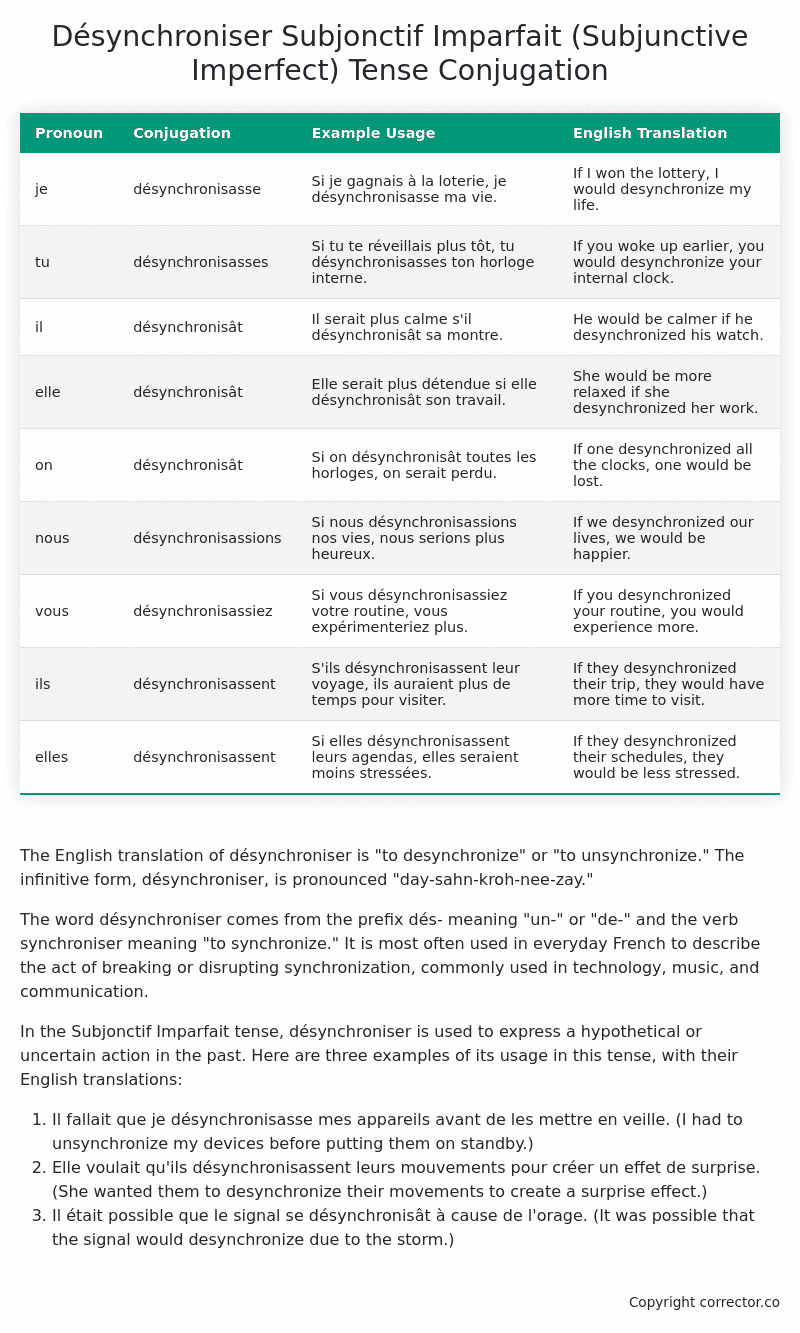Subjonctif Imparfait (Subjunctive Imperfect) Tense Conjugation of the French Verb désynchroniser
Introduction to the verb désynchroniser
The English translation of désynchroniser is “to desynchronize” or “to unsynchronize.” The infinitive form, désynchroniser, is pronounced “day-sahn-kroh-nee-zay.”
The word désynchroniser comes from the prefix dés- meaning “un-” or “de-” and the verb synchroniser meaning “to synchronize.” It is most often used in everyday French to describe the act of breaking or disrupting synchronization, commonly used in technology, music, and communication.
In the Subjonctif Imparfait tense, désynchroniser is used to express a hypothetical or uncertain action in the past. Here are three examples of its usage in this tense, with their English translations:
- Il fallait que je désynchronisasse mes appareils avant de les mettre en veille. (I had to unsynchronize my devices before putting them on standby.)
- Elle voulait qu’ils désynchronisassent leurs mouvements pour créer un effet de surprise. (She wanted them to desynchronize their movements to create a surprise effect.)
- Il était possible que le signal se désynchronisât à cause de l’orage. (It was possible that the signal would desynchronize due to the storm.)
Table of the Subjonctif Imparfait (Subjunctive Imperfect) Tense Conjugation of désynchroniser
| Pronoun | Conjugation | Example Usage | English Translation |
|---|---|---|---|
| je | désynchronisasse | Si je gagnais à la loterie, je désynchronisasse ma vie. | If I won the lottery, I would desynchronize my life. |
| tu | désynchronisasses | Si tu te réveillais plus tôt, tu désynchronisasses ton horloge interne. | If you woke up earlier, you would desynchronize your internal clock. |
| il | désynchronisât | Il serait plus calme s’il désynchronisât sa montre. | He would be calmer if he desynchronized his watch. |
| elle | désynchronisât | Elle serait plus détendue si elle désynchronisât son travail. | She would be more relaxed if she desynchronized her work. |
| on | désynchronisât | Si on désynchronisât toutes les horloges, on serait perdu. | If one desynchronized all the clocks, one would be lost. |
| nous | désynchronisassions | Si nous désynchronisassions nos vies, nous serions plus heureux. | If we desynchronized our lives, we would be happier. |
| vous | désynchronisassiez | Si vous désynchronisassiez votre routine, vous expérimenteriez plus. | If you desynchronized your routine, you would experience more. |
| ils | désynchronisassent | S’ils désynchronisassent leur voyage, ils auraient plus de temps pour visiter. | If they desynchronized their trip, they would have more time to visit. |
| elles | désynchronisassent | Si elles désynchronisassent leurs agendas, elles seraient moins stressées. | If they desynchronized their schedules, they would be less stressed. |
Other Conjugations for Désynchroniser.
Le Present (Present Tense) Conjugation of the French Verb désynchroniser
Imparfait (Imperfect) Tense Conjugation of the French Verb désynchroniser
Passé Simple (Simple Past) Tense Conjugation of the French Verb désynchroniser
Passé Composé (Present Perfect) Tense Conjugation of the French Verb désynchroniser
Futur Simple (Simple Future) Tense Conjugation of the French Verb désynchroniser
Futur Proche (Near Future) Tense Conjugation of the French Verb désynchroniser
Plus-que-parfait (Pluperfect) Tense Conjugation of the French Verb désynchroniser
Passé Antérieur (Past Anterior) Tense Conjugation of the French Verb désynchroniser
Futur Antérieur (Future Anterior) Tense Conjugation of the French Verb désynchroniser
Subjonctif Présent (Subjunctive Present) Tense Conjugation of the French Verb désynchroniser
Subjonctif Passé (Subjunctive Past) Tense Conjugation of the French Verb désynchroniser
Subjonctif Imparfait (Subjunctive Imperfect) Tense Conjugation of the French Verb désynchroniser (this article)
Conditionnel Présent (Conditional Present) Tense Conjugation of the French Verb désynchroniser
Conditionnel Passé (Conditional Past) Tense Conjugation of the French Verb désynchroniser
L’impératif Présent (Imperative Present) Tense Conjugation of the French Verb désynchroniser
L’infinitif Présent (Infinitive Present) Tense Conjugation of the French Verb désynchroniser
Struggling with French verbs or the language in general? Why not use our free French Grammar Checker – no registration required!
Get a FREE Download Study Sheet of this Conjugation 🔥
Simply right click the image below, click “save image” and get your free reference for the désynchroniser Subjonctif Imparfait tense conjugation!

Désynchroniser – About the French Subjonctif Imparfait (Subjunctive Imperfect) Tense
Formation
Common Everyday Usage Patterns
Interactions with Other Tenses
Subjonctif Présent
Indicatif Passé Composé
Conditional
Conditional Perfect
Summary
I hope you enjoyed this article on the verb désynchroniser. Still in a learning mood? Check out another TOTALLY random French verb conjugation!


